Achievements and Announcements
ACHIEVEMENTS
- ARC grants support innovation in environmental sustainability, preparing students for an AI world, and more
- Researchers recognised for global influence in human behaviour, environmental sustainability
- Chief Defence Scientist commends UniSA aerospace engineer
- Forest research leader named a ‘timber legend’ at industry awards
- High distinction for one of UniSA’s best science teachers
- Highest humanities honour for Professor Lester-Irabinna Rigney
- Professor Maureen Dollard honoured by Academy of the Social Sciences
- Student research into Parkinson’s presented at World Parkinson Congress
- Education student receives ministerial prize after overcoming health challenges
- Outstanding female researchers take out top prizes in Women in Innovation Awards
- Major SA Science Award for UniSA pain researcher
- PhD student impresses judges at 2023 Australian Good Design Awards
- SA Press Club honours exceptional UniSA student achievement
- UniSA shines at PR and comms awards with triple win
- Blue carpet rolled out for the 2023 Alumni Awards
- UniSA teaching alumni recognised
ANNOUNCEMENTS
- Education the key to closing the gap: 2023 Annual Hawke Lecture
- State legislation passed to create new Adelaide University
- UniSA and Uni of Adelaide join forces with global defence consortium
- Australia’s first Degree Apprenticeship offered in SA
- STEM Vailo motorsport event
APPOINTMENTS
ACHIEVEMENTS
ARC grants support innovation in environmental sustainability, preparing students for an AI world, and more
Six UniSA research teams have received Australian Research Council (ARC) Discovery grants with a total value of $3.4 million, and two have received ARC Linkage grants for a further $863,000, for projects commencing in 2024.
Set to support innovation and new knowledge across diverse fields, the successful Discovery projects include:
Professor Haolan Xu, UniSA Future Industries Institute, ($537,717): Multi-energy driven photothermal evaporators for all-weather desalination
This project aims to develop advanced technology to stably deliver clean water. Desalination practices will be enhanced by generating new interfacial solar evaporation systems that use multiple energy sources from the environment and are able to operate under variable weather conditions.
“This could significantly benefit remote communities in particular, which suffer from severe freshwater shortages. It will also enhance Australia’s research capabilities as a global leader in developing affordable, green desalination technologies.”
Professor Maarten De Laat, UniSA Education Futures, ($467,827): Equipping Australian teachers today to face AI tomorrow
Applications of Artificial Intelligence (AI) will transform how people work and learn, yet there is very little research on what teachers need to know in order to prepare students to thrive in this AI-rich society.
This study aims to construct a foundational understanding for teaching with, and about, AI. It will also show how to develop effective networks to empower teachers as active change agents.
Dr Jessica White, UniSA Creative, ($212,611): Finding Australia’s Disabled Authors: Connection, Creativity, Community
This project will explore writers living with disability, and disability more generally in Australian literature.
There is little awareness of the contributions that Australian authors living with disability have made to literary culture. This project will generate new knowledge about how these writers have forged their careers, and how their disability shapes their creative practice.
“We expect our investigation will foster a greater understanding of the diversity of Australian writers and literature, and greater support for emerging writers living with disability.”
Professor Natasha Harvey, UniSA’s Centre for Cancer Biology, ($947,849): Defining how cells relay mechanical signals to changes in cell architecture
Mechanical signals play crucial roles in shaping organs and entire organisms during development, though how these signals are relayed to changes in cell architecture is not known.
Within vascular networks, mechanical signals play key roles in vessel patterning, identity, and maturation.
“This research will increase our understanding of how cells sense touch and may be applied for tissue engineering purposes.”
Bradley Distinguished Professor Sharad Kumar, UniSA’s Centre for Cancer Biology, ($658,402): New mechanisms regulating the biogenesis of extracellular vesicles
Extracellular vesicles are small packages that contain active components derived from the cell of origin.
These vesicles, released by most cell types, are critical for communication between cells. However, the processes of their formation and release are poorly understood.
“Our project aims to explore how ubiquitination, a type of protein modification system, controls the production of extracellular vesicles. Using a strong collaborative team and highly innovative approaches, the project will generate new knowledge to inform how cells communicate.”
Professor Janna Morrison, UniSA Clinical and Health Sciences, ($575,713): Size matters, but at what cost? Role of male sex hormones in the placenta
This project aims to understand molecular pathways regulated by male sex hormones in the placenta that may contribute to fetal growth and survival outcomes in response to reduced oxygen and glucose.
“An advanced understanding of the sex-specific regulation of placental molecular function and foetal growth could be targeted in future studies to improve outcomes in placental mammals such as livestock, domestic pets, and humans.”
The successful Linkage projects include:
Professor Jun Ma, UniSA STEM, ($395,773): Flame-retarding and mechanically resilient elastomer composites
This project will develop a new generation of flame-retarding and mechanically resilient elastomer composites by taking advantage of nanoscale effect and synergy.
"The outcomes will be two types of flame-retarding additive pellets and their elastomer composites; these pellets also suit other polymers such as thermoplastics. The elastomer composites are expected to have excellent flame retardancy, mechanical properties, and fatigue performance.”
Professor Clive Prestidge, UniSA Clinical and Health Sciences, ($467,108): Engineering hybrid materials with functional bioactivity in the GI tract
This project aims to use an advanced particle engineering approach to develop novel biomaterials with multifunctional activities in the gastrointestinal tract.
"We expect to generate new knowledge of the key interfacial processes that control digestion, and identify new pathways for modulating gut microbiome composition.”
For further details see the media release announcing the grants.
Researchers recognised for global influence in human behaviour, environmental sustainability
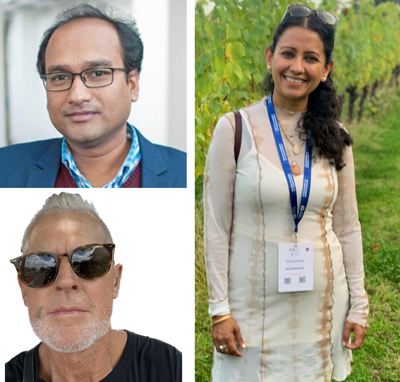 Clockwise from top left: Dr Binoy Sarkar, Professor Haywantee Ramkissoon, Professor Timothy Olds
Clockwise from top left: Dr Binoy Sarkar, Professor Haywantee Ramkissoon, Professor Timothy OldsThree UniSA researchers have made it onto a high-profile list that recognises the world’s most influential scientists.
The Clarivate Highly Cited Researchers list for 2023 was released in November. Those included on the list represent the world’s 1-in-1000 scientists and social scientists, based on citations and rigorous qualitative analyses.
This year is the first time that three UniSA researchers have been included, with Professor Haywantee Ramkissoon, Professor Timothy Olds and Dr Binoy Sarkar selected for the reach and impact of their multidisciplinary research.
Their achievements follow a year of rankings success for UniSA, which moved up in both the QS World Rankings 2024 and Times Higher Education (THE) World University Rankings 2024, and debuted at number 11 nationally in the Australian Financial Review’s inaugural Best Universities Ranking.
UniSA Deputy Vice Chancellor: Research and Enterprise and Standing Acting Vice Chancellor Professor Marnie Hughes-Warrington AO says UniSA rose 37 places in the QS 2024 rankings with improved scores in both Academic and Employer Reputation indicators, and moved up 29 places in the THE rankings.
“In a year when many Australian universities experienced drops, this is an impressive result,” Prof Hughes-Warrington says.
“With three of our researchers now featuring on Clarivate’s highly cited list among the world’s top 1% of scientists, it is proving to be an exciting year for acknowledging the quality of UniSA’s research.
“I congratulate Haywantee, Tim and Binoy for their achievements, and for the impact they are making in areas that are so critical to our global society.”
UniSA’s highly cited researchers, 2023
- Professor Haywantee Ramkissoon has authored 166 publications and been cited 5383 times. She studies how people’s attachment to places can lead them to adopt behaviours that benefit the environment, and why this is important for people’s wellbeing and the health of our planet.
- Dr Binoy Sarkar has authored 205 publications and been cited 8,807 times. His research uses multidisciplinary approaches to solve complex challenges in removing carbon dioxide from the atmosphere, storing carbon in soil and minerals, and improving soil quality to promote sustainable agriculture and forestry.
- Professor Timothy Olds has authored 456 publications and been cited 16,957 times for wide-ranging research that looks at how people use their time, and the impact these behaviours have on their health.
For further details on UniSA’s highly cited researchers, read the media release.
Chief Defence Scientist commends UniSA aerospace engineer
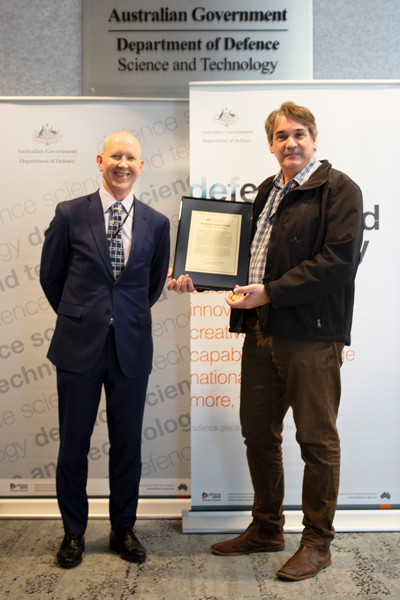 DSTG Acting Chief Platforms Dr Greg Bain (left) presents UniSA Professor Javaan Chahl with a Defence Commendation acknowledging his valuable partnership with DSTG and Defence.
DSTG Acting Chief Platforms Dr Greg Bain (left) presents UniSA Professor Javaan Chahl with a Defence Commendation acknowledging his valuable partnership with DSTG and Defence.Australia's Chief Defence Scientist has presented a Defence Commendation to Professor Javaan Chahl, DSTG Joint Chair of Sensor Systems at UniSA.
The commendation from Professor Tanya Monro AC acknowledges Professor Chahl's “valued, enduring partnership” with DSTG, particularly his work relating to unmanned aerial systems.
For more than a decade, Prof Chahl has worked closely with DSTG's aerospace operations teams to analyse key challenges and propose solutions that create a “tangible impact” on defence capability.
“In this domain, his deep understanding across a wide range of sensor, effector and aircraft technologies and his understanding of the art of the possible has grounded DSTG analysis in reality and has supported feasible options,” Prof Monro says.
Prof Chahl and his UniSA team have created technology prototypes in partnership with DSTG, including the Wanderer UAS, that moved from an idea to a flying prototype in a couple of months and was integrated into RAAF-led operations earlier this year.
“My main role for a project like Wanderer is to provide subject matter expertise on project steering and integration,” Prof Chahl says.
“Historically, uncrewed aircraft programs are at high risk of death spirals of scope creep. Wanderer has avoided these traps and is a simple, affordable, robust system suited to a range of Defence activities.”
Prof Chahl's team is currently working with DSTG's scientists on navigation in environments where access to global positioning systems are denied.
“Right now we are developing solutions that are working quite well using celestial navigation and optical cues from the ground. It is exacting research, but it is very satisfying when mathematics, new algorithms and interfacing results in a small foam drone knowing its real-time position from the stars.”
Forest research leader named a ‘timber legend’ at industry awards
The head of forest research at UniSA, Dr Jim O'Hehir, has been named a “Timber Legend” by the local industry.
The Green Triangle Timber Industry Awards recognise standout contributors in one of Australia’s major forestry regions, with the Green Triangle spanning the border between Victoria and South Australia and known as a prime location for growing and processing wood fibre.
Dr O’Hehir, who’s General Manager Forest Research at UniSA’s Forest Research Hub in Mount Gambier, was presented the Timber Legend Award for his exceptional dedication to the sector.
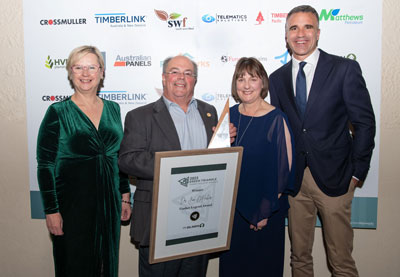 SA Primary Industries Minister Clare Scriven (left) and Premier Peter Malinauskas (right) presented the Timber Legend Award to UniSA general manager for forest research, Dr Jim O'Hehir, pictured with wife Judy O’Hehir, at the Green Triangle Timber Industry Awards.
SA Primary Industries Minister Clare Scriven (left) and Premier Peter Malinauskas (right) presented the Timber Legend Award to UniSA general manager for forest research, Dr Jim O'Hehir, pictured with wife Judy O’Hehir, at the Green Triangle Timber Industry Awards.The award was presented by Premier Peter Malinauskas and SA Primary Industries Minister Clare Scriven during a gala dinner with 500 guests, held in Mount Gambier in late October.
The judging panel thanked Dr O’Hehir for delivering groundbreaking research projects and his efforts in implementing technology advancements throughout the region. The panel also noted his passion for forestry and his tireless efforts in mentoring the next generation of industry leaders.
Dr O’Hehir says he’s very pleased to receive the award, acknowledging that it was an honour to be “involved with an industry with such motivated and innovative people that begins with tree breeding and ends with building houses for people to live in”.
UniSA Mount Gambier Regional Manager Ian McKay says it was great to see Dr O’Hehir recognised as 2023 Timber Legend.
“Having worked with Jim since the establishment of UniSA Forest Research Mount Gambier five years ago I have been able to observe the enormous respect that he is held within the forestry sector,” McKay says. “The leadership Jim has shown in establishing and developing the Forest Research Hub has been outstanding.”
Dr O’Hehir has spent almost 40 years in the plantation forest industry, dating back to 1984 when he started working for the Woods and Forests Department and later at ForestrySA, and Board and Chair positions at Tree Breeding Australia.
He started working as General Manager Forest Research at UniSA’s Forest Research Hub in 2018.
His special interest area is in plantation growth and yield management, including long term sustainability, growth, yield, modelling and plantation water use. He was instrumental in establishing the Mount Gambier Centre for the National Institute for Forest Products Innovation. Dr O’Hehir has also published papers, chaired seminars and workshops and presented at conferences both internationally and locally. He has qualifications in forest science, including a Bachelor of Science (Forestry) from ANU and a Master of Forest Science and PhD from the University of Melbourne.
High distinction for one of UniSA’s best science teachers
Maurizio Costabile’s lifelong fascination with science, passed on to thousands of students over the past 25 years, has culminated in a prestigious national teaching award.
The UniSA Associate Professor of Biochemistry and Immunology Education has won the 2023 SDR Scientific Education Award from the Australian Society for Biochemistry and Molecular Biology (ASBMB).
The award recognises Assoc Prof Costabile’s “innovative and creative” approach to science teaching, notably his interactive laboratory simulations that have significantly improved undergraduate students’ understanding of complex subjects over the past 10 years.
While all his simulations have led to significant improvements in student learning, his biggest achievement has been the elimination of all student failures in a specific biochemistry written laboratory report since introducing an articulate storyline simulation in 2014. Previously, up to 10% of students failed the written report.
The simulations are based on blended learning, incorporating online and face-to-face teaching.
By visualising complex molecular theories via 3D printed models, he has brought many topics to life, making them more relevant.
“Having multiple ways to interact with students ensures they can grasp scientific concepts more easily,” Assoc Prof Costabile says.
“I like to bring in new innovations every year and test them. Science brings new findings every day, often unexpected ones that turn your understanding of a topic on its head. That’s why it is such an exciting field.”
Assoc Prof Costabile will attend an international scientific education conference of his choosing in 2024. He also presented a lecture at this year’s ASMBM conference at ANU in Canberra.
The UniSA scientist is also in the running for the QS ReImagine Education Awards in Abu Dhabi in mid-December.
Highest humanities honour for Professor Lester-Irabinna Rigney
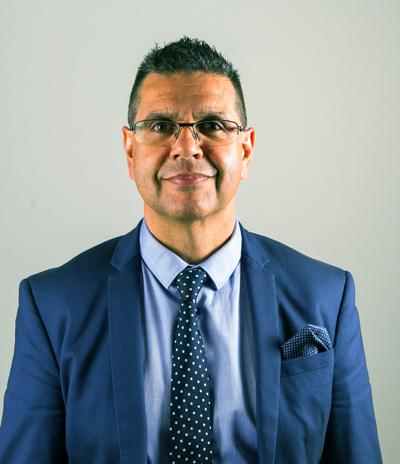
Indigenous educational leader and humanist, Professor Lester-Irabinna Rigney AM, has been inducted as an inaugural Fellow of the Australian Academy of Humanities in the newly established Indigenous Studies section.
The Fellowship is the highest honour within the humanities, recognising remarkable achievement in and contribution to the humanities in Australia. It comprises a vibrant community of experts and leaders who have made outstanding contributions to the humanities and cultural life of the nation.
Australian Academy of Humanities Executive Director Inga Davis says the new Indigenous Studies section is a significant milestone in the Academy’s history.
Prof Rigney is one of Australia’s most esteemed professors of education research. A descendant of the Narungga, Kaurna and Ngarrindjeri Peoples of South Australia, he is an international expert on Australian Culturally Responsive Schooling and advocate for children’s educational equality and reform.
He has worked in Aboriginal education for more than 20 years across various university appointments, state and federal government advisory boards and various other groups tasked with advancing Aboriginal and Torres Strait education.
His remarkable work in Aboriginal education has him at the helm of early learning, schooling and language rights around the world. He is well known for his teaching principles that encourage schools, teachers and researchers to build community partnerships and embed Aboriginal cultures as driving forces for transformative, culturally responsive education.
Renowned for supporting young people’s rights, Prof Rigney currently co-leads the Pedagogies for Justice Group, in the Centre for Research in Educational and Social Inclusion.
His research on culturally responsive teacher practice has put Australia at the forefront of innovation in teacher practice with diverse learners. This teaching method incorporates students’ cultural and linguistic intelligence and lived experiences into the classroom as tools for effective instruction. This model has rapid uptake across Australia and the Pacific.
“I accept the recognition of my life’s work on behalf of the voiceless children rights movement for equality, which is moving forward with determination. The right to inclusive, high-quality schooling for all children regardless of background is the answer to the political and moral question of our time”, Prof Rigney says.
He currently holds a Professorship of Education in the Education Futures academic unit.
Joining Prof Rigney is respected Kungarakan Elder, human rights and social justice campaigner, Professor Tom Calma AO, who was named an Honorary Fellow of the Australian Academic of the Humanities.
A graduate of UniSA’s antecedent institution, the South Australian Institute of Technology (SAIT), Prof Calma has dedicated his life to improving the lives of Indigenous Australians, being involved in Indigenous affairs at a local, state, national and international level for more than 40 years
Now Chancellor of the University of Canberra, he was the first Aboriginal or Torres Strait Islander man in 164 years to hold the position of Chancellor at an Australian university.
Prof Calma was one of the inaugural winners of the UniSA Alumni Awards and in 2023, he was named Senior Australian of the Year.
Professor Maureen Dollard honoured by Academy of the Social Sciences
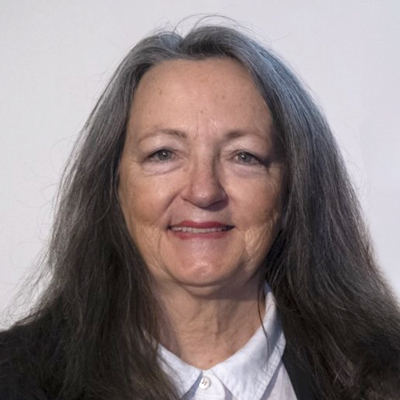
The director of UniSA’s Psychosocial Safety Climate Global Observatory at the Centre for Workplace Excellence, Professor Maureen Dollard, has been appointed as a Fellow of the Academy of the Social Sciences in recognition of her extensive contributions to workplace psychological health.
The academy is the peak body of social sciences in Australia and honours the country’s most distinguished researchers. Elected by their peers, Fellows of the Academy must demonstrate an outstanding contribution to a field of social science research or practice.
Prof Dollard is an internationally renowned expert on workplace mental health and is the founder of the Australian Workplace Barometer, a national survey of Australian workplace conditions. In addition, she is the creator of the StressCafé and the Psychosocial Safety Climate (PSC) theory, which has revolutionised how work stress is viewed.
Her groundbreaking research into workplace psychosocial factors and worker mental health has seen her advance the field, delivering evidence-based research to promote the understanding of workplace safety and productivity and.
In 2020, Prof Dollard was awarded a prestigious Australian Research Council (ARC) Laureate Fellowship worth $3.1 million to further her research into Australia’s corporate climate and to promote safer and better quality workplaces.
She is also the recipient of the 2020 ARC Kathleen Fitzpatrick Award, helping to promote and support women in research.
UniSA Executive Dean of Justice and Society, Professor Paula Geldens, says the award is "worthy and appropriate", recognising Prof Dollard's "significant body of work over many years".
Student research into Parkinson’s presented at World Parkinson Congress

Public health is a broad field focusing on improving health outcomes, preventing illness and understanding the factors that contribute to the health of populations and communities. So, when UniSA Public Health student Alannah Beston was deciding on a topic for her research project, it made sense to pick something close to her heart – how to live positively with Parkinson’s.
“I was inspired by both of my grandpas. They lived with Parkinson’s disease for most of their lives but found ways to work incredibly hard and be incredible men,” she says.
Alannah’s research project explored how salutogenesis – an approach to human health which focuses on physical and mental wellbeing and resilience, instead of disease itself – could deliver significant benefits for people with Parkinson’s.
Parkinson’s disease is a neurodegenerative disorder that causes problems with movement, tremors, stiffness and impaired balance. There is no known cure, which is why management strategies are so important.
This is where Alannah’s work comes in. Stepping into work as a Research Assistant at It’s Not Funny – a not-for-profit organisation that challenges perceptions of Parkinson’s – her undergraduate research project was made in industry collaboration with the CEO of It’s Not Funny Ed Shepherd and under supervision from her supervisor Dr Neil Bretaña. Her project has been acknowledged on the international stage. It was not only accepted as a presentation at the World Parkinson’s Conference, held in Barcelona earlier this year, but was also acknowledged as one of the top 10 abstract submissions.
“Having Alannah’s research, which was completely unfunded and done as part of her undergraduate degree, be commended by the Congress is an amazing achievement,” says Dr Bretaña.
Alannah’s story is an example of how a passion for advocacy and care for Australian populations can begin locally and spread internationally. Beginning her research career as a cited author, Alannah’s journey is only just beginning.
“Understanding what has helped my grandpas live to their greatest potential really motivated me,” Alannah says. “Through my studies and research, I realised the importance of advocacy, research, interventions, and delivery of health education.
“It’s been an incredible experience so far. I want to keep advocating for those with Parkinson’s by contributing further research, developing, and delivering high-quality health programs, education and promotion to encourage improved health and wellbeing.”
Education student receives ministerial prize after overcoming health challenges
A UniSA Early Childhood Education student who faced a lifetime of health issues has graduated with flying colours and earned recognition from the State Government for doing so.
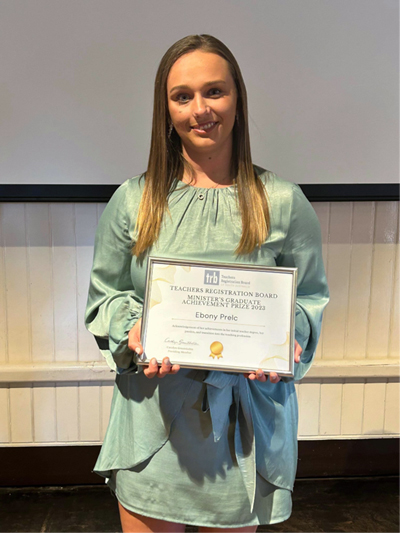 Ebony Prelc at the Teachers Registration Board of South Australia.
Ebony Prelc at the Teachers Registration Board of South Australia.Ebony Prelc has successfully completed her Bachelor of Early Childhood Education (Honours) and been awarded a Graduate Achievement Prize in recognition of her efforts.
Battling a brain tumour and the limitations of cerebral palsy – a condition affecting muscle control – Ebony navigated a series of health appointments, surgeries and treatments alongside her studies. Her remarkable effort was recognised in November when she was awarded the Minister’s Graduate Achievement Prize by the Teachers Registration Board of South Australia.
The Minister's Graduate Achievement Prize is an award designed to acknowledge students who have successfully overcome obstacles during their studies. These obstacles may include personal, academic, financial or health challenges that could have otherwise impeded their academic success.
Ebony was six-years-old when she was diagnosed with a fist-sized tumour on her brain stem. An eight-hour surgery caused optic nerve pressure, affecting her eyesight. At 14, the tumour recurred; however, it was fully removed.
The tumour returned during her last placement, which posed a challenge to stay focused and successfully complete not only her placement but her whole degree. In addition to optic nerve damage, scarring from surgeries led to difficulties in information processing. It brought Neuro-Fatigue into Ebony's life, which is normal tiredness with additional headaches, nausea and overwhelming exhaustion.
After eight years studying a half-time study load, and graduating, Ebony says she would love to embark on an early-year teaching career.
“I’m proud of completing my studies,” Ebony says. “I’ve overcome so many challenges to complete my degree. I’m grateful to the tutors and access and inclusion staff who have really supported me.
“When I started this degree, I wasn’t sure if I was clever enough to complete it. However, I have finished and cannot believe that I am here. I never imagined myself at this point (after study) because my journey was such a challenge. It's amazing to think that I'm really here at the end and I have now finished a degree.”
Ebony says she learnt to “keep going” and not question whether she could complete something but instead to focus on how she would complete something.
“I would love to have my own class and find permanent work in an early years’ classroom,” she says.
“Ultimately, it's not about trying to figure out how to juggle the workload and managing it. You have to be passionate about going on the learning journey with the children and working with them, and from here things will come naturally.
“You will only be able to learn and reflect your best when it means something to you. It is important to learn with children, learn from children and learn through children. Everyone is on their own journey and learns in a way that is meaningful to them.
“Your career in teaching reflects your life and experiences. Don't compare yourself to others; everyone is different. Enjoy life for what it is and love what you do.”
Outstanding female researchers take out top prizes in Women in Innovation Awards
A line-up of exceptional women across the UniSA community have been recognised for breaking boundaries and excelling in their fields of expertise.
Five women from UniSA were presented with Women in Innovation Awards, which aim to highlight women who are contributing to the state’s innovation economy by creating jobs, revenue and solutions to address some of the world’s biggest problems.
Among the overall 12 winners was Associate Professor in Geosciences at the Future Industries Institute Associate Professor Caroline Tiddy, who won the award for Maths and Data and who was described by Women in Innovation as a “rock star in the world of geosciences”.
“She’s on a quest to find better, eco-friendly ways to discover essential copper deposits for a sustainable future.”
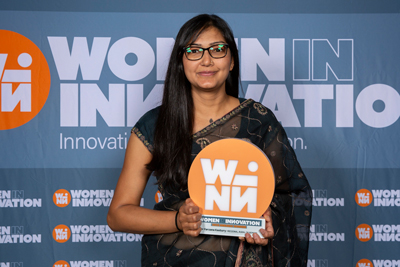
Dr Farzana Kastury, a UCL Santos Research Fellow from the Future Industries Institute, won the Rural, Regional and Remote Award.
Dr Kastury is a passionate environmental scientist who leads a team developing world-leading strategies to reduce the harmful impacts of childhood lead poisoning.
PhD student Franke Agenbag was recognised for Innovation and Intrapreneurship in Government. Agenbag is studying a PhD in aerospace, aeronautical and astronautical/space engineering and is a space systems engineer at Defence, Science and Technology (DST).
Professor of Work and Organisational Psychology Michelle Tuckey was awarded for Social Impact following a decade of research and development to combat workplace bullying.
Professor Tuckey’s Health Workplaces by Design program is the first of its kind globally and has been implemented in more than 85 workplaces across Australia, positively impacting nearly 10,000 employees.
Ishika Mahajan was named the Young Innovator for her dedication to seeking innovative therapeutic solutions for one of the most lethal brain cancers, Glioblastoma. Mahajan is now validating these discoveries through experiments, repurposing FDA-approved drugs traditionally used in treating Central Nervous System disorders and cancers.
UniSA sponsored the Engineering Award won by Sue Abbott, a strategic advisor at Aboriginal-owned company Birubi Australia. The award was presented by Professor Yan Zhuge.
Six other UniSA researchers were also finalists on the night: Associate Professor Belinda Chiera, Professor Lin Liu, Dr Barbara Drigo, Dr Mel McDowall, Dr Xanthe Strudwick and Dr Zoe Doubleday.
Major SA Science Award for UniSA pain researcher
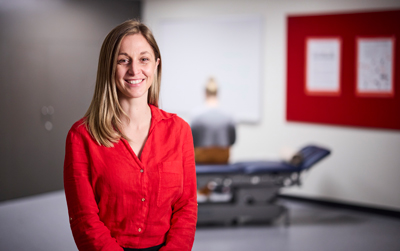 Photo by Randy Larcombe film + stills
Photo by Randy Larcombe film + stillsDr Hayley Leake is one of South Australia’s up and coming pain researchers, but while she’s often recognised for her win on Australian Survivor, it’s her research excellence that has her now in the spotlight.
Dr Leake won the PhD Research Excellence Award at the 2023 SA Science Excellence and Innovation Awards.
The awards recognise the outstanding work of South Australia’s science, technology, engineering, mathematics and medicine (STEMM) leaders, including educators, scientists, researchers and industry professionals.
A scientist and physiotherapist, Dr Leake is dedicated to improving the management of chronic pain in adolescence. With up to a third of teenagers experiencing chronic pain that extends into adulthood, this is an issue that has significant health and economic costs.
Dr Leake’s PhD focused on optimising the treatment of chronic pain among teenagers by integrating pain science education.
Deputy Premier Susan Close says that more STEMM professionals are needed to advance SA’s fastest-growing industry sectors.
“This year’s Science Excellence and Innovation Award winners – whether they’re in the lab working on the next major scientific breakthroughs, partnering with industry to bring new innovations to market, or in the classroom educating the next generation – all play a role in attracting young people to these critical fields,” Dr Close says.
“They are showing the nation – and the world – what South Australia is capable of, and inspiring the next generation of STEMM professionals.”
PhD student impresses judges at 2023 Australian Good Design Awards
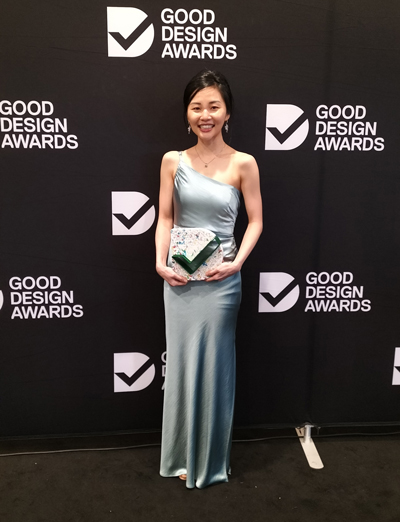 PhD student Aprille Chua Jia Qi at the 2023 Australian Good Design Awards.
PhD student Aprille Chua Jia Qi at the 2023 Australian Good Design Awards.UniSA PhD student Aprille Chua Jia Qi has won the 2023 Australian Good Design Award in the design research category.
In its 65th year, the Australian Good Design Awards showcase cutting-edge design projects from around the world, celebrating the best in design, architecture, engineering, research, fashion and social impact.
Aprille, who is from Singapore, took the top gong for her PhD design project using augmented graphics for healthcare workspaces.
The project involved embedding engaging and informative messages for healthcare staff into hospitals and clinics using a combination of augmented reality (AR) technology and environmental graphics to support workplace wellbeing.
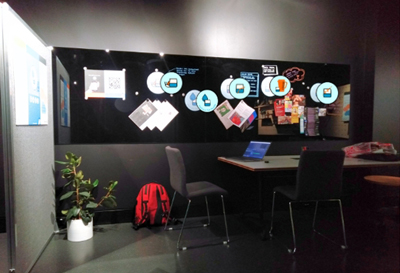 Aprille’s project involved embedding messages in healthcare workspaces to encourage employees to look after their wellbeing.
Aprille’s project involved embedding messages in healthcare workspaces to encourage employees to look after their wellbeing.Design prototypes were created including a wall-sized canvas and 3D objects (a jug and a drinking cup) combined with projected AR content that could be viewed in the office kitchen and in a building’s lobby by people waiting to take the lift.
Icons displayed within the office workstation encourage employees to use their mobile phone to view AR digital content – such as reminders to stay hydrated – while taking a break from work.
Aprille says that through a series of research activities, healthcare employees and members of the public provided positive feedback when the prototypes were displayed at MOD.
“The prototypes were seen to have the potential to effectively communicate wellness messages in the work environment and share messages to help stimulate conversations amongst colleagues,” she says.
The jury overseeing the awards program said: “This project uses innovation and creativity to address an important issue regarding worker wellbeing. We find the concept of moving beyond an app-only solution to include AR to be compelling way to optimise the project’s positive impact.”
Aprille says she couldn’t have won the award without the support of her supervisors, particularly principal supervisor Professor Ian Gwilt.
SA Press Club honours exceptional UniSA student achievement
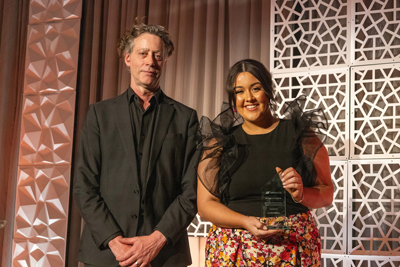 Associate Professor Stephen Ward, Dean of Programs for UniSA Creative, with Amelia Walters
Associate Professor Stephen Ward, Dean of Programs for UniSA Creative, with Amelia WaltersUniSA Journalism and Professional Writing and Communication and Media student Amelia Walters has impressed the judges at the 2023 SA Press Club Award, taking home the Student Journalism Award.
Walters, who is in her final year of study, was commended for her “versatility and professionalism” in telling “important, thoroughly researched and well-told stories”.
She says winning the Best Student Journalist Award is an “incredible honour”.
“Being awarded in front of a room full of journalists I have looked up to since I was little was a surreal experience and something I will cherish forever,” Walters says.
 Amelia in the UniSA radio studio
Amelia in the UniSA radio studio“Over the last four years, I have always strived to give a voice to those who may not have one and I hope to continue to do so in my professional career. I have always said that if I can make a difference through my reporting, then I can go to bed happy.”
Walters thanked the people who have become her mentors throughout her studies including UniSA Journalism program director Dr Bonita Mason and lecturer Neelu Sharma.
“They are both extremely strong and inspiring women who have helped me become the woman and journalist I am today,” she says.
During her studies Walters has interned with SBS in Sydney, working as an associate producer on the show Insight. In December she was highly commended at the national awards for student journalism, the Ossie Awards.
She hopes to pursue a career in broadcast television and is currently in the final round of applications for a highly contested ABC cadetship. If successful, Walters will become one of eight ABC cadet journalists in Australia.
The 15th SA Press Club Awards, held in November, recognised excellence in journalism across traditional and temporary platforms.
UniSA journalism alumni were also recognised for their talents including 2020 Journalism and Professional Writing graduate Chrystianna Konidis who won the award for best coverage of an issue or event via social media.
Riley Walter, a 2022 Journalism and Professional Writing graduate was highly commended for the Young Journalist of the Year and was a finalist in three other categories.
UniSA shines at PR and comms awards with triple win
UniSA was well represented at the Public Relations Institute of Australia (PRIA) 2023 Golden Target Awards, taking home a gold, silver and bronze awards across three categories.
The PRIA Golden Target Awards are Australia’s longest-running PR and communications industry awards program recognising high-achieving people, teams and agencies that have transformed businesses, brands and reputations.
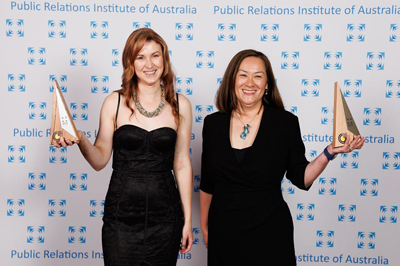 Master of Communication student Melissa Martin, left, and Dr Kim Burley, Online Program Facilitator, UniSA Online, at the PRIA Golden Target Awards.
Master of Communication student Melissa Martin, left, and Dr Kim Burley, Online Program Facilitator, UniSA Online, at the PRIA Golden Target Awards.Online program facilitator at UniSA Online, Dr Kim Burley, won the Bronze Award for Educator of the Year for her commitment to innovative teaching practices and efforts to shape the future of the profession.
Master of Communication student Melissa Martin was recognised with the Silver Award for Student of the Year for her achievements and advancements during her years of study.
Green Adelaide, a statutory board run by the SA Government to create a cooler, greener, wilder and climate-resilient city, won the Gold Award for Government Team of the Year.
Green Adelaide’s communication team is run by UniSA Master of Communication student Melissa Martin. Other members include journalism graduates Amy Park and Renee Pearson as well as Alicia Hage, who has worked as an online tutor with UniSA Online.
Blue carpet rolled out for the 2023 Alumni Awards
Four distinguished members of UniSA’s global alumni community were honoured at a ‘blue carpet’ event in late October, for the annual UniSA Alumni Awards.
The Alumni Awards were celebrated with a gala dinner in Pridham Hall (Yangkadlitya Wardli), which underwent a three-day transformation for the occasion.
The 2023 Alumni Award recipients were Henrietta Marrie AM, Arman Abrahimzadeh OAM, Elaine Bensted and Robert Hill-Smith.
Guests included staff, donors, alumni and community leaders. Read more and watch stories about the Alumni Award recipients on the UniSA alumni webpage.
UniSA teaching alumni recognised
A number of UniSA alumni have been recognised at the 2023 Public Education Awards.
The Public Education Awards showcase excellence and equity in the public education system, recognising the achievements of individuals and groups working for the Department for Education across South Australia.
Among this year’s recipients were UniSA alumni Lindsey Crowe, who’s the senior leader at Heathfield High, and Jim Dounas, who’s an assistant principal at Adelaide High School.
ANNOUNCEMENTS
Education the key to closing the gap: 2023 Annual Hawke Lecture
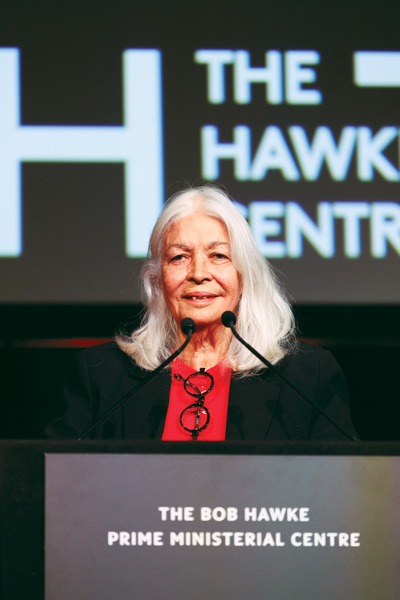 Professor Dr Marcia Langton AO delivered the 24th Annual Hawke Lecture, which is presented by The Bob Hawke Prime Ministerial Centre. Photo by Tony Lewis
Professor Dr Marcia Langton AO delivered the 24th Annual Hawke Lecture, which is presented by The Bob Hawke Prime Ministerial Centre. Photo by Tony LewisEducation is key to reconciliation and closing the gap for Aboriginal Peoples, says eminent Australian Indigenous scholar and activist Professor Dr Marcia Langton AO.
Prof Langton made the comments in delivering the 24th Annual Hawke Lecture in early December at the Adelaide Convention Centre.
Prof Langton told the audience she was encouraged by the Federal Government's commitment to advancing outcomes for Aboriginal Peoples, and hopeful for the establishment of regional voice structures.
She said the dire health and poverty of Aboriginal Peoples, together with youth justice, were high on the human rights agenda in closing the gap and that moving more young people into education and jobs was critical. She said it was clear that First Nations people want treaties, human rights and truth-telling.
The Annual Hawke Lecture is presented by The Bob Hawke Prime Ministerial Centre at UniSA. It provides an opportunity to listen to the views of someone whose experience of human affairs is notable, and whose concerns about our world are truly worthy of consideration. Lectures cover a wide range of topics from the environment to human rights to science.
Prof Langton has made significant contributions to the field of Indigenous law and social justice. Through her extensive academic work and public engagement, she has been instrumental in promoting a deeper understanding of Indigenous law and its relevance in contemporary Australian society.
A video of the lecture is available via the Hawke Centre website.
State legislation passed to create new Adelaide University
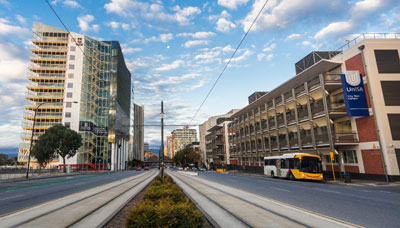
The University of South Australia and the University of Adelaide have recently welcomed the passage of legislation through the South Australian Parliament to create a new Adelaide University.
UniSA Vice Chancellor Professor David Lloyd and University of Adelaide Vice-Chancellor Professor Peter Høj AC, said it was an important step forward in realising the “ambitious vision for a contemporary, for-purpose university that will be truly transformative for future generations of learners and researchers, and the state of South Australia”.
“The path to today [16 November 2023] has been extensive. Following a comprehensive six-month feasibility assessment, parliamentary inquiry and State Parliament consideration and debate, the Adelaide University Act that will serve as the foundation of our new institution has now been passed,” the two vice chancellors said in a statement.
“We would like to thank our parliamentarians and the parliamentary Joint Committee for their confidence in our roadmap forward – to create a future-focused university that will produce graduates who are in global demand, while prioritising the needs of our local industries and communities through skills development and innovation through world-leading research.
“We have absolute clarity of purpose. Knowledge-based transformation leading to sustainable growth of a new Australian university that will consistently feature in the world’s top 1% is a compelling reason to exist. However, we acknowledge the responsibility and weighty task ahead of us – to deliver on our bold vision for the sector and state, and to open our doors come 1st January 2026.”
The passing of legislation through the State Parliament is a key enabler to the creation of a combined Adelaide University, which must now be proclaimed for the Act to come into operation and for the new entity to be established, which is expected to take place early next year. Following this, necessary regulatory approvals will be needed before a new, fledging university is formed.
“As we move through this next phase, we look forward to further engaging with our communities to co-create this future-focused institution,” the vice chancellors said.
In addition, in accordance with the Adelaide University Act, the two respective University Councils have made appointments to the new Adelaide University Transition Council, which will steer the strategic objectives of the future institution. Pauline Carr has been nominated as Chancellor of the Transition Council, along with Janet Finlay and the John Hill as the first two Deputy Chancellors.
More information can be found on the Adelaide University microsite.
UniSA and Uni of Adelaide join forces with global defence consortium

The University of South Australia and University of Adelaide have joined five leading universities in the United Kingdom and United States to support the AUKUS alliance.
World-class defence experts from seven universities in the US, UK and Australia have formed the Digital Disruption in Defence Research Consortium, which will analyse and assess cutting-edge data in partnership with government and industry.
It will also coordinate research to better understand the implications of digital disruption for defence, and to help shape policies and strategies that benefit its member nations.
The consortium is being led by representatives from:
- Defence Data Research Centre (DDRC) – Universities of Exeter, Liverpool, and Surrey
- Applied Research Laboratory for Intelligence and Security (ARLIS), University of Maryland College Park
- Lincoln Laboratory, Massachusetts Institute of Technology
- Carnegie Mellon University
- Defence & Security Institute (DSI), University of Adelaide
- Gordian Knot Center (GKC) for National Security Innovation, Stanford University
- Hoover Institution, Stanford University
- University of South Australia
UniSA director for Defence and Space, Matt Opie, says AUKUS will transform the Australian defence sector.
“South Australia is home to the nation’s premier naval ship and submarine activities, and as such, will play a key role in supporting the AUKUS strategic alliance,” Opie says. “It’s fitting that UniSA is part of this global defence consortium, sharing our research and helping to shape defence policy.”
The consortium will share its findings with ally nations and collaborate on future research with interested academic bodies in all relevant areas, including cyber operations, supply chain, and other data developments crucial to the future of military success.
Read more in the media release announcing the consortium.
Australia’s first Degree Apprenticeship offered in SA
From 2024, South Australian apprentices will be able to study at university and earn money while working for a defence employer under Australia’s first genuine Degree Apprenticeship.
Earlier this month, the South Australian Skills Commission formally declared the Bachelor of Software Engineering (Honours) to be a trade under the South Australian Skills Act 2008 – the final step in the process of approving new apprenticeships.
The State Government has committed $450,000 over three years to support the establishment of the software engineering degree apprenticeship, with the program to be delivered via a partnership between UniSA, the defence industry and peak national employer group, Australian Industry (Ai) Group.
The design of the apprenticeship was undertaken by UniSA and Ai Group, and supported by BAE Systems, Lockheed Martin Australia, DXC Technology, ASC (WA division), and the Defence Teaming Centre.
The degree apprenticeship will support new entrants in the growing defence sector, ahead of the construction of nuclear-powered AUKUS submarines.
It is the first time in Australia that apprentices who successfully complete their studies will receive a degree qualification as part of an apprenticeship.
The first intake of up to 30 apprentices will occur next year.
They will be paid to attend work and study at university and, critically, be provided with on-job training by qualified and skilled supervisors in work relevant to the Bachelor of Software Engineering (Honours).
Those who successfully complete the five-year apprenticeship will receive their degree and a trade certificate.
UniSA Provost and Chief Academic Officer Professor Joanne Cys welcomed the innovative software engineering pathway.
“To be delivered in collaboration with industry, the new software engineering degree apprenticeship will embed students in the workplace from day one, ensuring a real-world experience throughout their learning journey,” Prof Cys says.
“This program presents an exciting opportunity for UniSA and our partners to develop the next generation of engineers in this highly sought-after discipline.”
Premier Peter Malinauskas says it’s “an amazing opportunity for young people to undertake a high quality university education, while getting paid to work, and learn on the job, at a major defence employer”.
Read more in the SA Government media release.
STEM Vailo motorsport event
Inspiring girls to take an interest in science, technology, engineering and maths (STEM) is vital for Australia’s future workforce.
That’s why the UniSA STEM Innovation Experience (STEMIE) team was excited to join the Vailo Adelaide 500 in November to deliver the FIA Girls on Track program.
Operating at various motorsport events nationwide, the FIA Girls on Track program is designed to build interest in, and awareness of, opportunities within the motorsport industry – both on and off the track.
This year, more than 100 young girls (aged 8-15) engaged in a collection of activities such as media training, pit crew challenges, fitness and reaction timing exercises, and an engineering challenge to design the fastest race car prototype.
An additional 30 girls and young women (aged 15-22) participated in the Pathway Program in the afternoon. Featuring inspiring female guest speakers sharing their motorsport journeys, this session offered valuable knowledge about roles in the industry and provided opportunities to connect with people in motorsport.
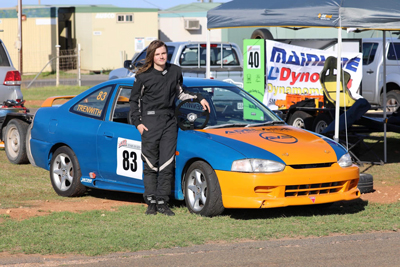 UniSA engineering student and motorsport competitor, Toby Trenwith, delivered a STEM workshop as part of the FIA Girls on Track program.
UniSA engineering student and motorsport competitor, Toby Trenwith, delivered a STEM workshop as part of the FIA Girls on Track program.STEMMIE program leader, UniSA’s Anita Trenwith from the Education Futures Outreach team, and UniSA engineering student and motorsport competitor, Toby Trenwith, delivered the STEM workshop at the event.
“It was fantastic to see so many girls interested in STEM aspects of motorsport,” Anita Trenwith says.
“Motorsport is traditionally a male-dominated space. By involving girls in trackside activities, they could really immerse themselves in the activities and hopefully inspire them to think about pathways into this exciting space.”
Minister for Women, Recreation, Sport and Racing, Katrine Hildyard, says the event empowers the next generation of motorsport leaders.
“Seeing girls and women included in traditionally male-dominated sports and supported and celebrated to get involved at every level, all the way to the top of the sport they love – celebrated for their strength and talent – is powerful.
“It can be transformative in terms of the way girls and women and the roles they can play are seen – in sport and everywhere else.”
The Education Futures Outreach team is now exploring collaboration with Motorsport Australia to introduce a motorsport industry-linked theme into the UniSA STEM Innovation Experience (STEMIE) program.
APPOINTMENTS
UniSA academics appointed to Australian Research Council College of Experts
Two UniSA academics have been appointed to the 2024 Australian Research Council (ARC) College of Experts.
UniSA Professor in Architecture Ning Gu and Associate Professor in Biophysics Ivan Kempson have been appointed to the ARC College of Experts, which plays a key role in identifying research excellence.
ARC chief executive officer Judi Zielke PSM said the new members, along with existing members, play critical roles in the competitive research grant process, which supports advancement of knowledge, contributes to national innovation, and delivers significant benefits to the Australian community.
“A total of 319 ARC College members will play a vital role in identifying research excellence, moderating peer assessments, and making funding recommendations under the ARC’s National Competitive Grants Program. It highlights the strength of the research community, and their willingness to contribute to the ARC and the overall research landscape in Australia.”
For more information about the ARC College of Experts, visit the ARC website.
Other Stories
- Time off means weight on for Aussie kids
- $10m precision engineering centre for defence manufacturing opens at Mawson Lakes
- Many people willing to sacrifice salary to work from home
- ‘I can see the characters’: how reading aloud to patients can break through ‘cancer fog’
- From the Vice Chancellor: Looking forward while reflecting on a stellar year
- Achievements and Announcements
- 2023 Wrapped: Watch highlights from the year that was
- Crows Captain prepares to kick goals in the classroom
- UniSA Online students set for overseas immersions thanks to New Colombo Plan Scholarships
- Podiatry team visits Kiribati to kickstart diabetic footcare
- In Pictures: Unstoppable Awards + Staff Service Awards
- The latest books from UniSA researchers




